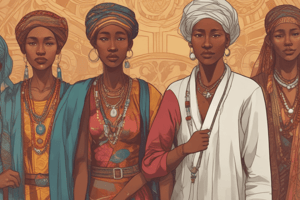Podcast
Questions and Answers
What group defines themselves through a rejection of the mainstream?
What group defines themselves through a rejection of the mainstream?
- Hepcats
- Hipsters (correct)
- Beatniks
- Hippies
Society and culture _____.
Society and culture _____.
- Are the same thing
- Are unrelated
- Could not exist together
- Could not exist without each other (correct)
This is an example of _______.
This is an example of _______.
- Ethnocentrism (correct)
- Xenocentrism
- Paradigms
- Moral relativism
Xenocentrism is:
Xenocentrism is:
A cultural universal is:
A cultural universal is:
Many Americans pay for haircuts, trips to the dentist, or transportation on the metro and bus systems. These actions support the notion of capitalism, an example of _____.
Many Americans pay for haircuts, trips to the dentist, or transportation on the metro and bus systems. These actions support the notion of capitalism, an example of _____.
Which of the following is an example of a cultural universal?
Which of the following is an example of a cultural universal?
Kurt's perspective is an example of _______.
Kurt's perspective is an example of _______.
Which of the following is an example of cultural relativism?
Which of the following is an example of cultural relativism?
Angelica is experiencing _____.
Angelica is experiencing _____.
The term values can be defined as:
The term values can be defined as:
Janet is experiencing a form of ____.
Janet is experiencing a form of ____.
Which of the following is NOT an example of a formal norm within the United States?
Which of the following is NOT an example of a formal norm within the United States?
What is one difference between a more and a folkway?
What is one difference between a more and a folkway?
The term language can be defined as:
The term language can be defined as:
MTV's widely-watched TV series The Jersey Shore is an example of _____, while the obscure works of playwright Sam Shepard are an example of ______.
MTV's widely-watched TV series The Jersey Shore is an example of _____, while the obscure works of playwright Sam Shepard are an example of ______.
Which of the following is an example of a counterculture?
Which of the following is an example of a counterculture?
In 1999, Sean Fanning, John Fanning, and Sean Parker invented Napster, a global, free-of-charge, peer-to-peer music sharing program. They created _____.
In 1999, Sean Fanning, John Fanning, and Sean Parker invented Napster, a global, free-of-charge, peer-to-peer music sharing program. They created _____.
Both shows depicted the lives of members of the LGBT (lesbian, gay, bisexual, transgender) community, thus giving viewers a glimpse into a ______.
Both shows depicted the lives of members of the LGBT (lesbian, gay, bisexual, transgender) community, thus giving viewers a glimpse into a ______.
Which of the following is an example of an informal sanction?
Which of the following is an example of an informal sanction?
Flashcards are hidden until you start studying
Study Notes
Cultural Definitions and Concepts
- Hipsters: Groups that identify themselves through the rejection of mainstream culture.
- Ethnocentrism: A viewpoint where one believes their own culture is superior, often displayed through negative judgments of other cultures.
- Xenocentrism: The belief that foreign culture is better than one’s own; it is the opposite of ethnocentrism.
- Cultural Universal: Traits or patterns common across all societies; for example, incest taboos.
- Non-material Culture: Represents the beliefs, practices, and principles of a culture, exemplified by Americans engaging in services like haircuts or transportation.
Cultural Interactions and Norms
- Cultural Relativism: Understanding and accepting another culture’s practices, demonstrated by someone adopting local customs while abroad.
- Culture Shock: The disorientation felt when exposed to a significantly different culture.
- Formal Norms: Enforced behaviors expected in society, such as obeying traffic laws.
- Mores: Serious norms with significant consequences if violated, unlike folkways, which are less strict.
Social Dynamics
- Cultural Imperialism: Imposing one culture over another, often with condescending assumptions about the foreign culture.
- Counterculture: A movement that actively rejects and opposes mainstream or dominant cultural norms, exemplified by the hippie movement of the 1960s.
- Subculture: A smaller cultural group within a larger culture, showcasing distinct values or interests, such as the LGBT community depicted in specific TV series.
Language and Communication
- Language: Encompasses gestures, signs, words, and signals used for communication and cultural transmission.
Innovations and Cultural Influence
- Innovation: Introduction of new ideas or tools that change social practices, such as the creation of Napster for music sharing.
- Popular vs. High Culture: The distinction between widely accepted cultural products available to the masses (like MTV shows) and those considered sophisticated or elitist (like certain playwrights).
Social Sanctions
- Informal Sanction: Social consequences that are not codified in laws, such as peer reactions to behavior, exemplified by bullying.
- Formal Sanction: Official penalties imposed for breaking laws or formal rules, like imprisonment for tax evasion.
Key Differences in Norms
- Folkways vs. Mores: Folkways are minor norms with no severe repercussions for violations, while mores have serious consequences, underscoring societal standards.
Studying That Suits You
Use AI to generate personalized quizzes and flashcards to suit your learning preferences.




